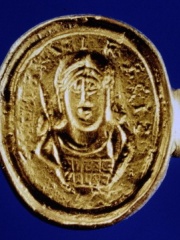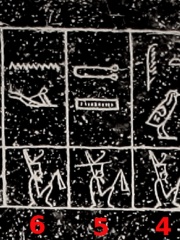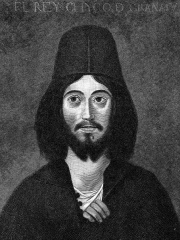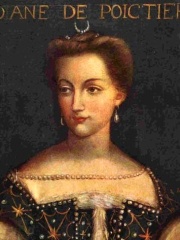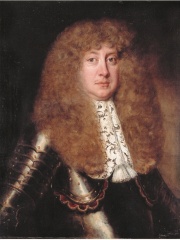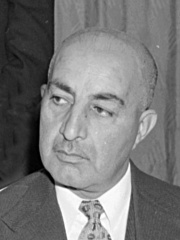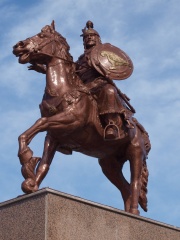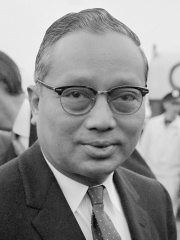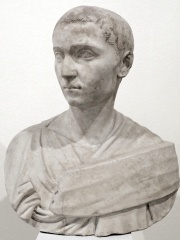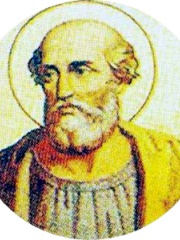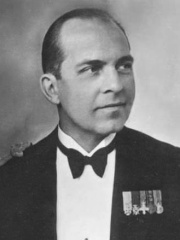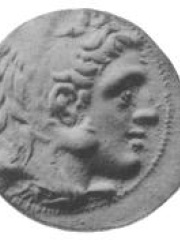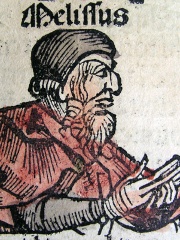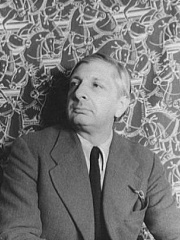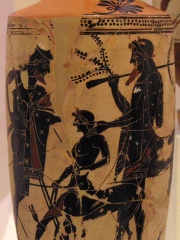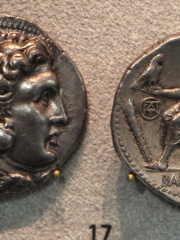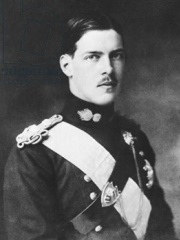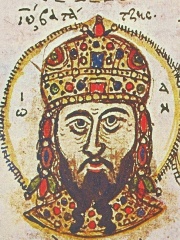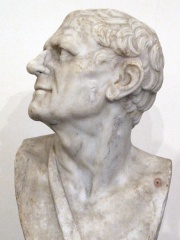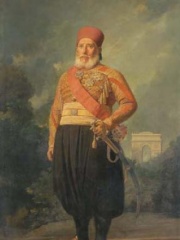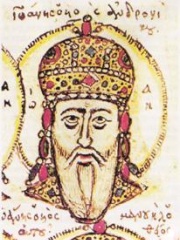Politician
Creon
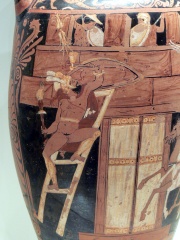
 Creon
Creon
Creon may refer to: Read more on Wikipedia
His biography is available in 40 different languages on Wikipedia (up from 39 in 2024). Creon is the 1,110th most popular politician (down from 979th in 2024), the 85th most popular biography from Greece (up from 88th in 2019) and the 28th most popular Greek Politician.
Creon is most famous for his role in the tragedy Antigone. Creon is the ruler of Thebes and the uncle of Antigone. Antigone's brother, Polyneices, has died in battle against his own city. Creon decrees that Polyneices' body should be left unburied, as a punishment for treason. Antigone, however, insists on giving her brother a proper burial. Creon sentences her to death, but she hangs herself first.
Memorability Metrics
Page views of Creon by language
Among Politicians
Among politicians, Creon ranks 1,110 out of 19,576. Before him are Childeric I, Wazner, Muhammad XII of Granada, Diane de Poitiers, Andrew II of Hungary, and Omri. After him are Ernest Augustus, Elector of Brunswick-Lüneburg, Mohammed Daoud Khan, Asparuh of Bulgaria, William I of the Netherlands, U Thant, and Philip II.
Most Popular Politicians in Wikipedia
Go to all RankingsChilderic I
440 - 481
HPI: 75.38
Rank: 1,104
Wazner
3500 BC - 3050 BC
HPI: 75.37
Rank: 1,105
Muhammad XII of Granada
1459 - 1532
HPI: 75.37
Rank: 1,106
Diane de Poitiers
1499 - 1566
HPI: 75.37
Rank: 1,107
Andrew II of Hungary
1175 - 1235
HPI: 75.37
Rank: 1,108
Omri
1000 BC - 900 BC
HPI: 75.37
Rank: 1,109
Creon
HPI: 75.37
Rank: 1,110
Ernest Augustus, Elector of Brunswick-Lüneburg
1629 - 1698
HPI: 75.36
Rank: 1,111
Mohammed Daoud Khan
1909 - 1978
HPI: 75.36
Rank: 1,112
Asparuh of Bulgaria
640 - 700
HPI: 75.36
Rank: 1,113
William I of the Netherlands
1772 - 1843
HPI: 75.35
Rank: 1,114
U Thant
1909 - 1974
HPI: 75.35
Rank: 1,115
Philip II
237 - 249
HPI: 75.35
Rank: 1,116
In Greece
Among people born in Greece, Creon ranks 85 out of 1,024. Before him are Pope Hyginus (100), Galla Placidia (388), Paul of Greece (1901), Antigonus I Monophthalmus (-382), Handan Sultan (1574), and Melissus of Samos (-470). After him are Giorgio de Chirico (1888), Irene Papas (1929), Mikis Theodorakis (1925), Mardonius (-600), Hippias (-443), and Arion (-700).
Others born in Greece
Go to all RankingsPope Hyginus
RELIGIOUS FIGURE
100 - 142
HPI: 75.67
Rank: 79
Galla Placidia
POLITICIAN
388 - 450
HPI: 75.63
Rank: 80
Paul of Greece
POLITICIAN
1901 - 1964
HPI: 75.58
Rank: 81
Antigonus I Monophthalmus
POLITICIAN
382 BC - 301 BC
HPI: 75.43
Rank: 82
Handan Sultan
POLITICIAN
1574 - 1605
HPI: 75.42
Rank: 83
Melissus of Samos
PHILOSOPHER
470 BC - 430 BC
HPI: 75.38
Rank: 84
Creon
POLITICIAN
HPI: 75.37
Rank: 85
Giorgio de Chirico
PAINTER
1888 - 1978
HPI: 75.23
Rank: 86
Irene Papas
ACTOR
1929 - 2022
HPI: 75.21
Rank: 87
Mikis Theodorakis
COMPOSER
1925 - 2021
HPI: 75.16
Rank: 88
Mardonius
MILITARY PERSONNEL
600 BC - 479 BC
HPI: 75.10
Rank: 89
Hippias
PHILOSOPHER
443 BC - 399 BC
HPI: 75.06
Rank: 90
Arion
WRITER
700 BC - 660 BC
HPI: 75.03
Rank: 91
Among Politicians In Greece
Among politicians born in Greece, Creon ranks 28. Before him are George II of Greece (1890), Peleus (null), Galla Placidia (388), Paul of Greece (1901), Antigonus I Monophthalmus (-382), and Handan Sultan (1574). After him are Philip III of Macedon (-359), Alexander of Greece (1893), John III Doukas Vatatzes (1192), Lysimachus (-361), Ibrahim Pasha of Egypt (1789), and John V Palaiologos (1332).
George II of Greece
1890 - 1947
HPI: 75.76
Rank: 22
Peleus
HPI: 75.70
Rank: 23
Galla Placidia
388 - 450
HPI: 75.63
Rank: 24
Paul of Greece
1901 - 1964
HPI: 75.58
Rank: 25
Antigonus I Monophthalmus
382 BC - 301 BC
HPI: 75.43
Rank: 26
Handan Sultan
1574 - 1605
HPI: 75.42
Rank: 27
Creon
HPI: 75.37
Rank: 28
Philip III of Macedon
359 BC - 317 BC
HPI: 74.78
Rank: 29
Alexander of Greece
1893 - 1920
HPI: 74.74
Rank: 30
John III Doukas Vatatzes
1192 - 1254
HPI: 74.69
Rank: 31
Lysimachus
361 BC - 281 BC
HPI: 74.64
Rank: 32
Ibrahim Pasha of Egypt
1789 - 1848
HPI: 74.26
Rank: 33
John V Palaiologos
1332 - 1391
HPI: 74.18
Rank: 34
